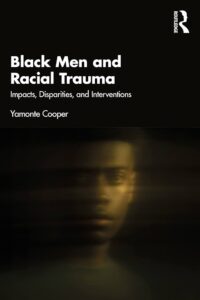Book Review: Black Men and Racial Trauma: Impacts, Disparities, and Interventions
Review by: Nancy Maguire
Section Editors: Serena Wadhwa & Omewha Beaton
 Yamonte Cooper, (New York, NY: Routledge), 2024, 314 Pages, ISBN 978-1032554105 (hardback), 978-1032554112 (paperback)
Yamonte Cooper, (New York, NY: Routledge), 2024, 314 Pages, ISBN 978-1032554105 (hardback), 978-1032554112 (paperback)
Dr. Yamonte Cooper’s work, Black Men and Racial Trauma: Impacts, Disparities and Interventions, is seminal. He begins by articulating the meaning of anti-Blackness, simply and clearly stated as “racism based on the historical narrative and construct that white people and Black people are essentially white and Black.” He goes on to examine this truth as it pertains to Black people, specifically Black men. He highlights how this narrative impacts individuals, institutions, and systems, and how racism is directed at Black men from each of these levels. Further, Dr. Cooper illuminates the specific ways that racism constitutes trauma and how trauma has a lasting and intergenerational impact on Black people. The breadth of his work is substantial and will open doors to further research across many disciplines as the nuanced reality of his scholarly work is explored.
Throughout, the book often reads as a litany; I could almost hear the affirmative nods and "amens" that would accompany the truthtelling of the oppression of Black men. Interwoven with this is a theoretical perspective that unifies many lines of inquiry. These include the Unified Theory of Racism, the Subordinate Male Target Hypothesis, Transgenerational Trauma Points Theory, racebased traumatic stress, and many more. The text then introduces an integrated model of racial trauma (IMRT).
The pervasiveness of oppression touches every aspect of Black life in America. It is found in federal laws and state regulations—and extends to local rules of real estate licensing. It dictates decisions about where highways are built and how schools are funded. Dr. Cooper brings all of this into stark focus, enabling readers to truly grasp the profound reality of being Black in America. By highlighting racism, its profound meaning, widespread impact, and constant daily presence in the lives of Black men at all levels of society, he exposes the significant limitations of our current understanding of trauma. Jesmyn Ward's autobiographical book Men We Reaped serves as a powerful and haunting companion work, speaking in deeply personal terms to the very truths Dr. Cooper asks us to confront.
The book also challenges a range of academic perspectives, from feminism to intersubjectivity. The thread of Black men’s oppression becomes especially taut in this section. Cooper reminds us that there may be an inclination to dismiss such a perspective. His work echoes early feminist literature and scholarship that sought to expose the shortcomings, omissions, and distortions in psychoanalytic psychology; sociological perspectives on women, marriage, and childrearing; religious views of women; and the broader social mandate of femininity. One example is the then-groundbreaking book Women and Psychotherapy by Rachel HareMustin and Annette Brodsky ( 1980), or the more accessible Ms. Magazine, at a time when the use of “Ms.” was a political statement. The consciousness-raising efforts of women in the 1970s are mirrored in the Young Warriors Program, which fosters critical awareness among Black boys ( Watts & Abdul-Adil, 1997). Black Men and Racial Trauma will be read and referenced by researchers and clinicians seeking to deepen, expand, and carry this important work forward.
The perspective of Black Men and Racial Trauma is important as it opens up lines of inquiry, as nuance is needed and will certainly follow. The recent work of Loiseau and Mahalik ( 2025) is one example of how research will elucidate Dr. Cooper’s work, finding the more granular implications and moving research and policy forward. Future research can translate into real social change, including changes to policy and the enactment of laws that serve to reduce the impact of racism on Black men. There is no doubt Dr. Cooper’s work will be referenced repeatedly for years to come.
For clinicians treating trauma, this is an essential read for two reasons. First, reading about trauma gives clinicians a chance to reflect on their own reactions, whether or not the trauma is shared. Clinicians need to be aware of their own defensive, emotional, and cognitive responses. This is where the value of a litany comes in: when a client begins to process their own experience, the clinician can respond from a more self-aware place. Second, while the clinical sections detailing interventions and techniques are more limited in scope, the book's main focus is the impact of anti-Black racism directed toward Black men. It provides essential foundational knowledge that clinicians often lack. Understanding this broader context is crucial for effective treatment, even if specific therapeutic techniques are not extensively covered. It remains an important book for clinicians who need to grasp the full scope of what their Black male clients face.
This book is written with clinicians in mind, but limiting its audience to them would be a mistake. It speaks to a much wider group. From Black individuals across genders who need to hear a voice that speaks to their reality, to undergraduate classes in sociology, psychology, and history, many would benefit from reading Black Men and Racial Trauma.
Nancy Maguire, Psy.D., is a licensed psychologist who earned her doctorate from the Institute for Graduate Clinical Psychology at Widener University. Following her degree, she worked extensively within the child welfare system with children who had experienced abuse and neglect, and now specializes in trauma treatment, advocating for increased access to psychotherapy for marginalized communities. Dr. Maguire has held leadership roles as Treasurer and President of the Philadelphia Area Group Psychotherapy Society, currently serves on the training committee at the Syzygy Institute, and co-authored the chapter “Sex, Gender, and Psychological Assessment: Integrating Principle and Feminist Ethics” in the Handbook of Gender, Sex and Psychological Assessment.
